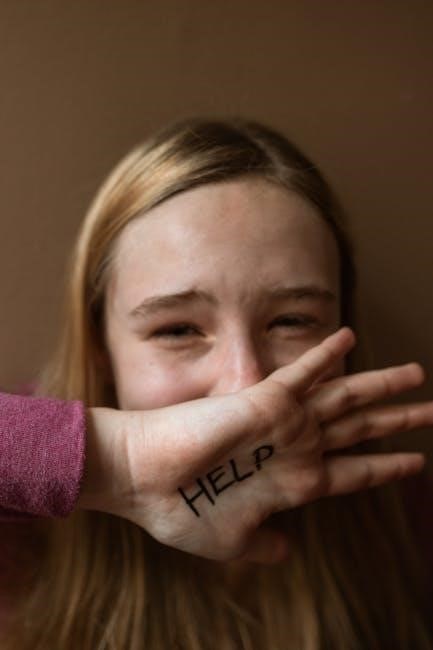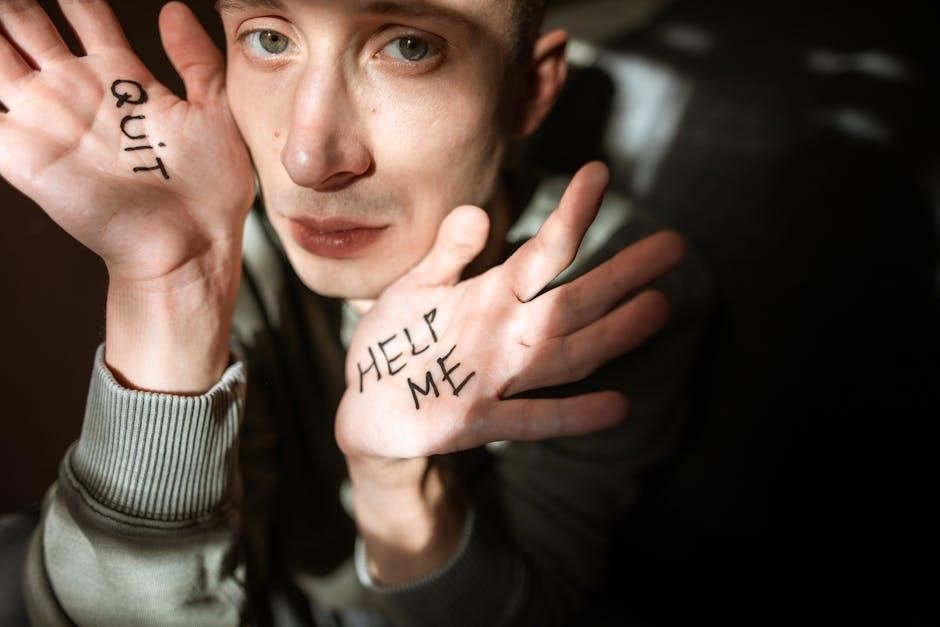Survivor guilt is a complex emotional response to surviving traumatic events while others do not, often tied to moral conflict and a deep sense of helplessness․
Nancy Sherman’s “The Moral Logic of Survivor Guilt” explores this phenomenon, highlighting the psychological and ethical struggles of those who feel undeserving of survival or safety․
It examines how guilt stems from the desire to help others in crises, creating a paradox of moral responsibility and emotional distress in survivors․
Definition and Overview
Survivor guilt is a psychological phenomenon where individuals experience guilt for surviving a traumatic event while others did not․ It often manifests as a moral conflict, where survivors question their right to live or thrive when others suffered or perished․ This emotional response is deeply tied to feelings of helplessness and self-blame, as seen in cases of natural disasters, combat, and other crises․ Nancy Sherman’s work, “The Moral Logic of Survivor Guilt,” provides a foundational understanding of this concept, exploring its ethical and psychological dimensions․ It serves as a key resource for comprehending the complexities of this emotional state․
Historical Context and Relevance
Survivor guilt has been documented across various historical events, such as the Holocaust and combat scenarios, where individuals grappled with the moral implications of survival․ Nancy Sherman’s “The Moral Logic of Survivor Guilt” highlights its prevalence among veterans and disaster survivors, illustrating its enduring relevance․ The concept gained prominence in psychological studies post-WWII, particularly in understanding PTSD․ Sherman’s work bridges historical cases with contemporary psychological theories, offering a comprehensive perspective on why survivor guilt remains a significant issue in modern times, impacting mental health and ethical reasoning․
Psychological and Philosophical Foundations
Survivor guilt is rooted in psychological and philosophical struggles, often tied to feelings of helplessness and moral responsibility․ Nancy Sherman’s work explores how individuals question their right to survive, linking guilt to ethical dilemmas․ Philosophically, it reflects a clash between self-preservation and the desire to help others, creating internal conflict․ Psychologically, it manifests as self-blame and emotional distress, often intertwined with PTSD and anxiety․ Sherman’s analysis bridges these dimensions, offering insights into how survivor guilt challenges personal and societal moral frameworks, emphasizing the need for compassion and understanding in addressing such complex emotions․

The Psychological Roots of Survivor Guilt
Survivor guilt stems from psychological struggles, including feelings of helplessness and moral responsibility, often manifesting as self-blame and emotional distress, as explored in Sherman’s analysis․
Post-Traumatic Stress Disorder (PTSD) and Survivor Guilt
Survivor guilt often co-occurs with PTSD, as individuals struggle to process traumatic events․ Flashbacks, nightmares, and emotional distress intensify feelings of moral responsibility and self-blame․ Sherman’s analysis highlights how PTSD amplifies survivor guilt, as survivors grapple with why they lived while others did not․ This psychological interplay creates a cycle of guilt and trauma, making it challenging to heal without addressing both conditions simultaneously․ The moral conflict inherent in survivor guilt further complicates PTSD recovery, underscoring the need for targeted therapeutic approaches to alleviate these intertwined emotional burdens․
The Role of Anxiety and Depression
Anxiety and depression significantly contribute to survivor guilt, as individuals experience overwhelming emotional distress․ These mental health struggles often stem from feelings of moral failure and helplessness, as discussed in Sherman’s work․ Anxiety manifests as relentless self-doubt, while depression intensifies emotional numbness and worthlessness․ Together, they amplify the belief that one is undeserving of survival, hindering recovery and perpetuating a cycle of guilt․ Addressing these emotional layers is crucial for healing, requiring a holistic approach to mental health and moral reconciliation․
Self-Blame and Moral Conflict
Self-blame and moral conflict are central to survivor guilt, as individuals grapple with feelings of wrongdoing for surviving while others perish․ Sherman’s analysis highlights how survivors often impose harsh moral judgments on themselves, believing they could have done more to prevent tragedy․ This internalized guilt fosters a deep sense of responsibility, blurring the lines between actual control and perceived failure․ Such moral conflict can lead to prolonged emotional suffering, as survivors struggle to reconcile their actions with their ethical beliefs, intensifying feelings of shame and inadequacy․

Moral Philosophy and Survivor Guilt
Moral philosophy frames survivor guilt as a conflict between ethical responsibility and helplessness, with Sherman’s work emphasizing the moral logic of guilt in survival scenarios․
Nancy Sherman’s Perspective on Moral Logic
Nancy Sherman’s work explores survivor guilt through a moral lens, emphasizing the ethical conflict between the desire to help and the inability to do so in traumatic situations․
She argues that guilt arises from a sense of moral failure, even when survival is beyond one’s control, highlighting the paradox of helplessness and responsibility․
Her analysis bridges psychological and philosophical perspectives, offering insights into how survivors grapple with feelings of indebtedness and the moral weight of living while others perish․
The Concept of Moral Responsibility
Moral responsibility in survivor guilt often stems from feelings of duty toward others, even in uncontrollable situations, leading to self-blame and ethical conflict․
Survivors may feel responsible for not preventing the event or for being spared, despite lacking actual control, creating a deep sense of moral indebtedness․
This concept is tied to societal expectations of heroism and sacrifice, amplifying guilt when individuals perceive their actions as insufficient or when they survive while others do not․
The Just-World Hypothesis and Its Implications
The Just-World Hypothesis suggests that people inherently believe the world is fair, where good deeds are rewarded and bad actions punished․ This belief is shattered when individuals survive traumatic events while others do not, leading to survivor guilt․
The hypothesis implies that survivors may blame themselves for perceived injustices, amplifying feelings of moral responsibility and emotional distress․ This psychological conflict highlights the ethical dilemmas explored in Nancy Sherman’s “The Moral Logic of Survivor Guilt”, emphasizing the tension between fairness and uncontrollable circumstances․
Such beliefs can exacerbate guilt, as survivors struggle to reconcile their survival with the suffering of others, reflecting the profound impact of moral reasoning on trauma․

Manifestations of Survivor Guilt
Survivor guilt manifests through emotional turmoil, self-blame, and moral conflict, often rooted in the belief that one’s survival is undeserved, as explored in Sherman’s work․
Emotional and Behavioral Symptoms
Survivor guilt often manifests as intense emotional distress, including self-blame, remorse, and feelings of undeserved survival․ Individuals may experience persistent sadness, anxiety, and irritability, complicating their ability to cope with daily life․ Behavioral symptoms can include social withdrawal, self-sabotage, or compulsive altruism, as survivors attempt to reconcile their guilt․ These emotional and behavioral expressions are deeply rooted in the moral conflict explored in Sherman’s work, where the desire to help others clashes with the reality of survival, leading to a cycle of psychological and emotional turmoil that can impair overall well-being and interpersonal relationships․
Cognitive Distortions and Irrational Beliefs
Survivor guilt often involves cognitive distortions, such as self-blame, where individuals irrationally believe they could have prevented the tragedy․ They may think, “I should have died” or “I failed others․” These beliefs stem from a flawed moral logic, where survivors impose unrealistic expectations on themselves․ Such distortions can lead to a cycle of guilt, reinforcing feelings of worthlessness and shame․ Sherman’s work highlights how these irrational beliefs are deeply tied to moral responsibility, creating a mental struggle that exacerbates emotional pain and complicates the healing process, as survivors grapple with the perceived injustice of their survival․
Social Withdrawal and Stigma
Social withdrawal is a common manifestation of survivor guilt, as individuals isolate themselves to avoid reminders of the traumatic event․ This isolation can stem from feelings of shame or unworthiness, exacerbated by societal stigma․ Survivors may feel they don’t deserve support or connection, leading to further emotional distancing․ Sherman’s analysis underscores how this withdrawal perpetuates guilt, as survivors struggle to reconcile their survival with the loss of others․ The stigma attached to their guilt can prevent them from seeking help, deepening their emotional pain and hindering recovery, thus creating a cycle of isolation and self-punishment that is difficult to break․
Real-World Examples and Case Studies
Holocaust survivors, natural disaster victims, and combat veterans often exhibit survivor guilt, as explored in Nancy Sherman’s work, highlighting the moral conflict of surviving while others perish․
Survivor Guilt in Holocaust Survivors
Holocaust survivors often experienced profound survivor guilt, grappling with the moral conflict of surviving while millions perished․ This guilt was deeply tied to the trauma of witnessing unimaginable atrocities and the helplessness of being unable to save others․ Many survivors struggled with feelings of undeservingness, questioning why they lived while others did not․ This phenomenon is explored in Nancy Sherman’s work, which highlights the psychological and ethical struggles of survivors․ Their stories illustrate the lasting impact of survivor guilt, blending PTSD, moral responsibility, and the haunting question of “why me?”
Survivor Guilt in Natural Disaster Survivors
Natural disaster survivors often experience survivor guilt, feeling remorse for surviving while others lost their lives or homes․ This guilt can stem from the randomness of survival, leading to questions of fairness and moral deservingness․ Nancy Sherman’s work highlights how survivors may feel a moral obligation to justify their survival, often through acts of altruism․ This guilt can manifest as anxiety, depression, or a sense of duty to help others, reflecting the complex interplay of trauma, morality, and resilience in the aftermath of disasters․
Survivor Guilt in Combat Veterans
Combat veterans frequently grapple with survivor guilt, stemming from the moral and ethical dilemmas of warfare․ Nancy Sherman’s analysis reveals how soldiers often question their survival when comrades fell, leading to profound emotional and psychological distress․ This guilt is intertwined with PTSD, self-blame, and a sense of moral failure․ Sherman’s work underscores the struggle to reconcile actions in combat with personal values, highlighting the need for empathy and understanding in addressing their trauma and fostering resilience․
The Role of Altruism and Helping Others
Survivor guilt often stems from a moral conflict: the desire to help others in crises but being unable to do so, leading to altruistic actions as a coping mechanism․
The Desire to Help and Its Moral Implications
In Nancy Sherman’s work, the desire to help others during traumatic events is central to survivor guilt․ This moral impulse creates a sense of responsibility, often leading to feelings of failure when one cannot act․ The inability to help, despite the wish to do so, exacerbates guilt․ This conflict between moral intention and practical limitation underscores the ethical complexity of survivor guilt, highlighting how altruistic desires can deepen emotional pain when circumstances prevent action․ This dynamic is a key aspect of Sherman’s analysis;
Survivor Guilt as a Motivator for Altruistic Actions
Survivor Guilt as a Motivator for Altruistic Actions
Survivor guilt often fuels a profound desire to act altruistically, transforming emotional pain into purposeful behavior․ Nancy Sherman highlights how guilt can motivate individuals to help others, compensating for feelings of helplessness․ This moral response reflects a paradox: while guilt stems from perceived inadequacy, it also drives meaningful actions that honor those who did not survive․ By channeling guilt into positive change, survivors find a way to reconcile their emotions with a sense of moral duty, creating a path toward healing and redemption;
The Paradox of Helplessness
The paradox of helplessness lies in the tension between the desire to act and the inability to do so, a central theme in Nancy Sherman’s “The Moral Logic of Survivor Guilt”․
Survivors often grapple with feelings of powerlessness despite their moral obligation to help, creating a profound emotional and ethical conflict․ This paradox underscores the complexity of guilt, where the inability to prevent harm coexists with a deep sense of responsibility․ Sherman explores how this duality shapes the survivor’s psyche, leading to both distress and a drive to find meaning through action, even in the face of overwhelming helplessness․

Cultural and Social Perspectives
Cultural and social contexts shape survivor guilt experiences, with societal norms influencing feelings of responsibility and moral obligation, as explored in Sherman’s analysis of guilt dynamics․
Cultural Differences in Experiencing Survivor Guilt
Cultural norms significantly influence how survivor guilt is expressed and processed․ In individualistic cultures, guilt often manifests as personal remorse, while collectivistic societies may tie it to communal responsibility․
Nancy Sherman’s work highlights that cultural expectations around morality and duty shape the intensity of guilt feelings, particularly in cases of trauma or loss․ For example, Holocaust survivors and combat veterans often experience guilt differently based on societal norms and support systems․ Understanding these cultural differences is crucial for addressing survivor guilt effectively and fostering healing within diverse contexts․
Social Support Systems and Their Impact
Social support systems play a pivotal role in mitigating survivor guilt, offering emotional and practical assistance to those grappling with trauma․ Communities with strong networks often foster resilience, reducing feelings of isolation․
Nancy Sherman emphasizes that societal structures can either alleviate or exacerbate guilt, depending on their responsiveness; For instance, veterans and disaster survivors benefit from organized support, which helps them reconcile their experiences․ Conversely, lack of understanding or resources can deepen emotional wounds, underscoring the importance of cultivating compassionate environments to aid recovery and healing․
Stigma and Societal Expectations
Stigma and societal expectations often intensify survivor guilt, as individuals may feel pressured to conform to certain behaviors or emotions deemed appropriate by their communities․ Nancy Sherman discusses how survivors are sometimes expected to embody gratitude or strength, which can lead to internal conflict when their true feelings diverge from these expectations․ This disconnect can result in self-blame and isolation․ Addressing these societal pressures is crucial for fostering understanding and empathy, allowing survivors to navigate their guilt without the burden of external judgment or unrealistic expectations․

Addressing and Overcoming Survivor Guilt
Therapeutic approaches like cognitive-behavioral therapy and trauma-focused interventions can help alleviate survivor guilt by reframing irrational beliefs and fostering self-compassion, as outlined in Sherman’s work․
Therapeutic Approaches and Interventions
Therapeutic approaches such as cognitive-behavioral therapy (CBT) and trauma-focused interventions are effective in addressing survivor guilt․ These methods help individuals reframe irrational beliefs and reduce self-blame․ Sherman’s work emphasizes the importance of fostering self-compassion and moral repair․ Techniques like exposure therapy and mindfulness-based stress reduction can also alleviate symptoms․ Group therapy provides a supportive environment for sharing experiences and reducing stigma․ By addressing the moral and emotional conflicts, these interventions promote resilience and healing, enabling survivors to rebuild their lives and find meaning in their experiences without being overwhelmed by guilt․
The Role of Forgiveness and Self-Compassion
Forgiveness and self-compassion are crucial in alleviating survivor guilt․ Nancy Sherman’s work highlights how self-forgiveness can release individuals from the burden of perceived moral failures․ Practicing self-compassion helps survivors acknowledge their humanity and the uncontrollable nature of traumatic events․ Forgiveness, both of oneself and others, fosters emotional healing and reduces internalized guilt․ Sherman emphasizes that these practices are not about erasing accountability but about creating space for understanding and peace․ By embracing compassion, survivors can move beyond guilt and rebuild a sense of self-worth and purpose․
Building Resilience and Meaning
Building resilience and meaning is essential for overcoming survivor guilt․ Sherman’s work suggests that survivors can find purpose by channeling their guilt into positive actions, such as helping others or advocating for justice․ This shift from guilt to meaningful engagement fosters resilience and healing․ By reframing their experiences, survivors can transform guilt into a catalyst for growth, redefining their identity and sense of purpose; This process involves acknowledging pain while embracing life’s value, ultimately fostering a path toward renewal and psychological well-being․
Educational and Research Resources
Nancy Sherman’s “The Moral Logic of Survivor Guilt” PDF, Cornell Notes, and online courses provide valuable insights and study materials for understanding survivor guilt․
Nancy Sherman’s “The Moral Logic of Survivor Guilt” PDF
Nancy Sherman’s “The Moral Logic of Survivor Guilt” provides a deep exploration of the ethical and emotional struggles faced by survivors of traumatic events․ The PDF delves into the moral conflict of feeling guilty for surviving while others did not, examining the psychological and philosophical underpinnings of this phenomenon․ Sherman discusses how survivor guilt is often intertwined with PTSD, anxiety, and a sense of moral responsibility․ She also highlights the paradox of wanting to help others in crises but being unable to do so, which exacerbates feelings of guilt․ This resource is essential for understanding the complexities of survivor guilt and its moral dimensions․
Cornell Notes and Study Materials
Cornell Notes and study materials on the moral logic of survivor guilt offer a structured approach to understanding Nancy Sherman’s insights․ These resources provide summaries of key concepts, case studies, and analytical frameworks․ They explore survivor guilt’s moral dimensions, emphasizing the emotional and ethical struggles of those who survive traumatic events․ The materials are particularly useful for students and researchers, offering a clear overview of the psychological and philosophical underpinnings of survivor guilt․ They also include exam prep and lecture notes, making them invaluable for academic and personal study․
Online Courses and Lectures
Online courses and lectures on the moral logic of survivor guilt provide in-depth explorations of Nancy Sherman’s work and its implications․ Platforms like Coursera and edX offer modules that delve into the psychological and ethical dimensions of survivor guilt, featuring case studies and real-world applications․ These resources are designed to educate students and researchers, offering a comprehensive understanding of survivor guilt’s moral and emotional complexities․ Many courses include interactive forums, video lectures, and assignments to engage learners and foster deeper analysis of Sherman’s theories․
Nancy Sherman’s “The Moral Logic of Survivor Guilt” offers profound insights into the ethical and emotional struggles of survival, emphasizing empathy and understanding as vital for healing․
Survivor guilt is a complex phenomenon rooted in moral and emotional struggles, often emerging after traumatic events․ Nancy Sherman’s “The Moral Logic of Survivor Guilt” delves into its ethical dimensions, exploring how survivors grapple with feelings of undeserved survival and helplessness․ The concept highlights the paradox of survival, where guilt arises from the inability to help others, despite circumstances beyond one’s control․ Sherman’s work underscores the deep connection between moral responsibility and emotional distress, offering insights into the human experience of loss, justice, and resilience; Her analysis provides a framework for understanding and addressing this profound psychological challenge․
Future Directions for Research and Understanding
Research on survivor guilt should explore its cultural and societal variations, as well as its intersection with mental health conditions like PTSD and depression․ Sherman’s work emphasizes the need to study how moral frameworks influence guilt and recovery․ Future studies could investigate effective therapeutic interventions and the role of social support in mitigating guilt․ Additionally, understanding survivor guilt in diverse contexts, such as natural disasters and combat, could provide broader insights․ Expanding empirical research and fostering interdisciplinary collaboration will enhance our understanding and improve support systems for those affected․
The Importance of Empathy and Support
Empathy and support are crucial in helping individuals cope with survivor guilt, as they foster a sense of connection and understanding․ Sherman’s work underscores the need for compassion in breaking the cycle of self-blame․ Creating safe environments where survivors feel heard can aid in their healing journey․ Support systems, whether through therapy or community networks, play a vital role in reducing stigma and encouraging emotional recovery․ By promoting empathy, society can help survivors reconcile their guilt and rebuild their lives with dignity and hope․
